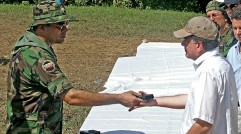Subs make the difference as Belgium beat U.S
(Reuters) - A well-timed substitution can change the course of any soccer match but when the game runs to 120 minutes and is played in the energy-sapping heat of northeast Brazil, substitutes really come into their own.
So it proved in Belgium's 2-1 victory over the United States on Tuesday.
For the first 90 minutes of their World Cup second-round clash, Belgium threw everything they had at the Americans but could not find the back of the net. It ended 0-0 and went to extra time.
Enter striker Romelu Lukaku.
Within three minutes of coming on and with his team mates tiring in the humidity and heat of Salvador, Lukaku burst down the wing on a fresh pair of legs and crossed for Kevin De Bruyne to score.
Twelve minutes later, De Bruyne returned the compliment, setting up Lukaku to fire home Belgium's second.
The United States pulled a goal back and again it was a substitute who made the difference.
Teenager Julian Green came on for Alejandro Bedoya in the 107th minute and scored what proved to be a consolation goal within seconds.
Coincidence? Surely not. Goals from substitutes have been a striking feature of this World Cup and prove that teams consist of far more than the 11 players in their starting line-up.
Of the 154 goals scored in Brazil, 29 have come from substitutes.
From Miroslav Klose's historic strike for Germany against Ghana in the group stage to Klaas-Jan Huntelaar's 94th minute penalty for the Netherlands that knocked out Mexico, goals from substitutes have been crucial.
They have been responsible for 18.83 percent of the goals at this World Cup compared with 10.34 percent at the 2010 World Cup.
Why the increase?
One reason is that coaches tend to introduce substitutes much earlier in a match than previously.
In the past, it was quite common for coaches to wait until the final minutes of a game and then throw on three substitutes, either in a desperate bid to win it or to waste time and hold on to a lead.
These days, coaches increasingly accept that, given the physical demands of the modern game, if you can use 14 players rather than 11 you might as well do so.
Ironically, another substitute could easily have given the United States victory.
In the dying minutes of normal time with the match goalless, second-half substitute Chris Wondolowski had a glorious chance to score but scooped his effort over the crossbar from five meters, allowing the Belgians back into the match.
"I said fresh legs would be important today and that is how it was," Belgium coach Marc Wilmots said. "Now the whole of Belgium can celebrate."
Subscribe to Latin Post!
Sign up for our free newsletter for the Latest coverage!














